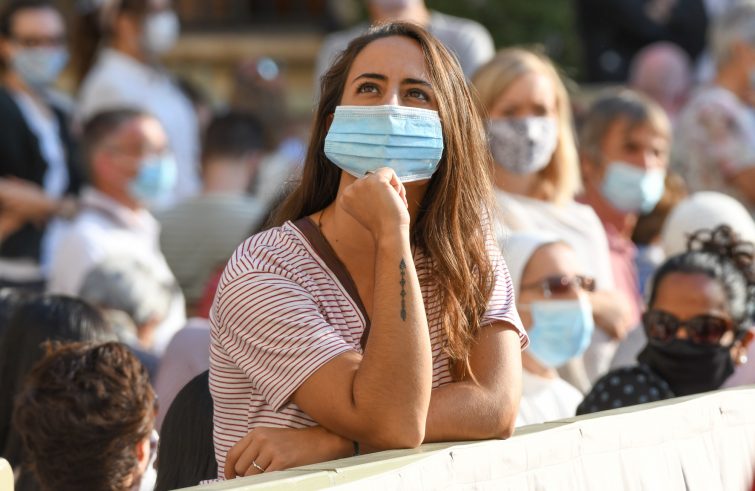
“I especially appreciated its style, speaking as a Mother Church that feels the pain of her children, one who shares that pain and bears its burden.” Simona Borello, communication expert, thus described the Message to the Christian communities in a time of pandemic, released by the Permanent Council of the Italian Episcopal Conference. “As a communicator – she continued – I am touched by the mission entrusted to us to be witnesses of hope. In these months of infodemic, anxiety, bad news, with people denying reality with acts of violence, we need to rediscover word-inspiring beauty, rather than constant protests. Yielding to negative events is easy, it’ s much harder to care for and restore the value of beauty.”
A time of a pandemic as a time of tribulation but also of prayer, the bishops point out. To what extent can the Bible provide support?
Biblical references are present throughout the Message. In fact, the Bible can be an instrument for prayer even for those who don’t attend Mass for various reasons – old age, small children – although Eucharistic celebrations are held in complete safety and in compliance with anti-Covid regulations. Abundant use of the Scriptures undoubtedly contributes to show that we find ways of praying at home while remaining close to our community.
Families, especially the elderly and women, are the most affected by the pandemic. The Bishops specifically call for increased support: what more can be done, and through which practical steps?
Caritas and parishes, working in complete safety, are at the forefront of responding to the most urgent needs and requirements of families in distress as a result of the ongoing health emergency.
We can do better by constantly reminding ourselves that we are a community. Distance must be respected, our elderly and loved ones must be protected, but we should always remember that the Church has an inherently communal nature. If not, by dint of isolation aimed at our own protection – a duty we must fulfil in this time of pandemic – we will end up losing sight of it.
In the Christian community, the homage of the bishops, the health crisis was addressed with great pastoral creativity. Could you describe some personal experiences?
Here in Turin we continued our work with the Biblical group remotely, together with the Ecclesial Movement for Cultural Commitment (MEIC). Thanks to the Meet video platform, we were able to practice the continuous reading of the Bible, and surprisingly, registrations have increased. In fact, those who were previously unable to attend in person for various reasons, have now resumed attendance thanks to the online mode. We plan our schedule in advance to avoid an overlapping of voices. Furthermore, in collaboration with the Diocesan Catechetical Office, we held livestreamed formation sessions for educators, reaching out to people and making them feel involved, once again together. In the message of the Permanent Episcopal Council, reference is made to these tools with an emphasis on local creativity:
laudably, each diocese responds to the suggestions of Italian Bishops nationwide, with the “creativity of charity”,
as the Pope describes it, throughout their territorial area.
Despite the emergency measures in place, Holy Mass is a vital occasion for spiritual nourishment. In the time of Covid-19, have also our priests’ homilies changed?
It’s hard to give a general answer, the homilies are very different from one another, just as the priests who deliver them are different. In my conversation with some priests, I gathered their intention to deliver a shorter homily, so that the liturgy would be shorter, not in order to shorten the service but for the safety of the faithful in times of pandemic. In terms of content, I noted difficulties in addressing certain issues:
in fact, in this period speaking about the challenging times we are experiencing is of the essence. If not, homilies will loose their substance, people will get distracted and will no longer go to Mass.
We should not forget the personal experience of the presbyters, affected by the pandemic – them or the people entrusted to them – which challenges their service as heralds of hope. Finally, there is a risk of
attention-seeking attitudes that may emerge in Masses and livestreamed homilies:
there must be a reasonable balance that prevents the presbyter from being the most important person to the detriment of the active involvement of the community. In the encyclical Evangelii gaudium, Pope Francis tells us that the priest must be at the service of dialogue between God and his people. Sometimes, in homilies and livestreamed Masses, this dimension risks being lost.
What role can priests and the faithful play to overcome the notion of “every man for himself” and transform this time into a time of “social rebirth”, as the bishops call for?
The Second Vatican Council put forward the concept of “the people of God”, that we have somewhat forgotten today. It is rarely mentioned even in liturgy, with the exception of the Feast of Christ the King, which we recently celebrated.
It is necessary to encourage occasions for meeting in communication with others, even from a distance, in the knowledge of our unity in Christ.
The people of God who walk together with their shepherds shun the notion of “every man for himself”, for by being with others we are inherently saved. To walk together means knowing that my effort is your effort. No one is saved alone.










